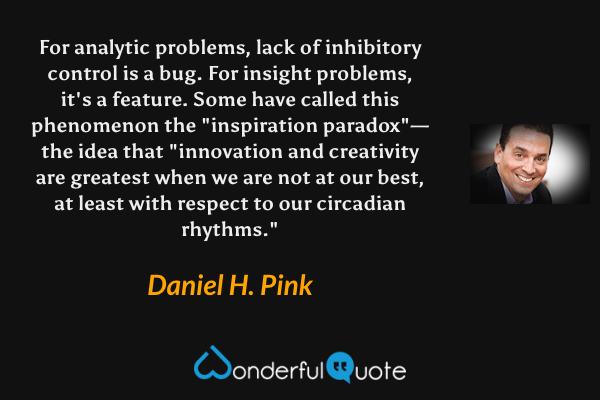Daniel H. Pink Quotes
Most popular Daniel H. Pink Quotes

High performers work for fifty-two minutes and then break for seventeen minutes.

If a picture is worth a thousand words, a metaphor is worth a thousand pictures.

For most of us, those sharp-minded analytic capacities peak in the late morning or around noon.

The essential requirement: Any extrinsic reward should be unexpected and offered only after the task is complete.

First, consider nontangible rewards. Praise and positive feedback are much less corrosive than cash and trophies.

What ultimately matters, then, is that type, task, and time align—what social scientists call "the synchrony effect."

Alertness and energy levels, which climb in the morning and reach their apex around noon, tend to plummet during the afternoons.

Only contingent rewards—if you do this, then you'll get that—had the negative effect. Why? "If-then" rewards require people to forfeit some of their autonomy.

Empathy is a stunning act of imaginative derring-do, the ultimate virtual reality—climbing into another's mind to experience the world from that person's perspective.
![SDT [Self-Determination Theory], by contrast, begins with a notion of universal human needs. It argues that we have three innate psychological needs—competence, autonomy, and relatedness. - Daniel H. Pink quote.](/img/q/16/1416A-sdt-self-determination-theory-by-contrast-begins-with-notion-universal-daniel-h-pink.png)
SDT [Self-Determination Theory], by contrast, begins with a notion of universal human needs. It argues that we have three innate psychological needs—competence, autonomy, and relatedness.

Positive affect—language revealing that tweeters felt active, engaged, and hopeful—generally rose in the morning, plummeted in the afternoon, and climbed back up again in the early evening.

Goals may cause systematic problems for organizations due to narrowed focus, unethical behavior, increased risk taking, decreased cooperation, and decreased intrinsic motivation. Use care when applying goals in your organization.

Goals that people set for themselves and that are devoted to attaining mastery are usually healthy. But goals imposed by others—sales targets, quarterly returns, standardized test scores, and so on—can sometimes have dangerous side effects.

Our cognitive abilities do not remain static over the course of a day. During the sixteen or so hours we're awake, they change—often in a regular, foreseeable manner. We are smarter, faster, dimmer, slower, more creative, and less creative in some parts of the day than others.

For analytic problems, lack of inhibitory control is a bug. For insight problems, it's a feature. Some have called this phenomenon the "inspiration paradox"—the idea that "innovation and creativity are greatest when we are not at our best, at least with respect to our circadian rhythms."

In short, all of us experience the day in three stages—a peak, a trough, and a rebound. And about three-quarters of us (larks and third birds) experience it in that order. But about one in four people, those whose genes or age make them night owls, experience the day in something closer to the reverse order—recovery, trough, peak.
!["When money is used as an external reward for some activity, the subjects lose intrinsic interest for the activity," he [Professor Edward Deci] wrote. Rewards can deliver a short-term boost—just as a jolt of caffeine can keep you cranking for a few more hours. But the effect wears off—and, worse, can reduce a person's longer-term motivation to continue the project. - Daniel H. Pink quote.](/img/q/10/1410A-when-money-is-used-as-an-external-reward-some-activity-daniel-h-pink.png)
"When money is used as an external reward for some activity, the subjects lose intrinsic interest for the activity," he [Professor Edward Deci] wrote. Rewards can deliver a short-term boost—just as a jolt of caffeine can keep you cranking for a few more hours. But the effect wears off—and, worse, can reduce a person's longer-term motivation to continue the project.


